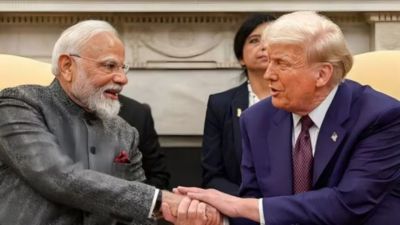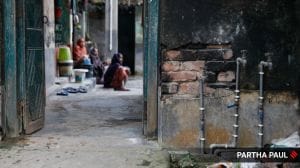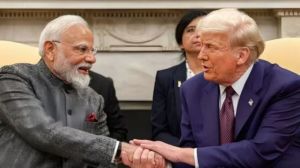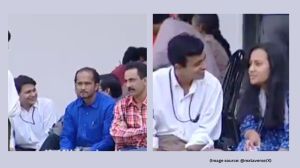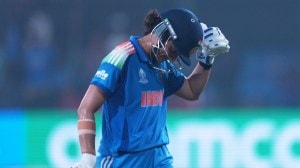Simply put: The Dalits and the Cow, in the Sangh’s words
When the RSS recently spoke for ‘SC brothers’ and condemned Gau Rakshaks, it broke from an established tradition.
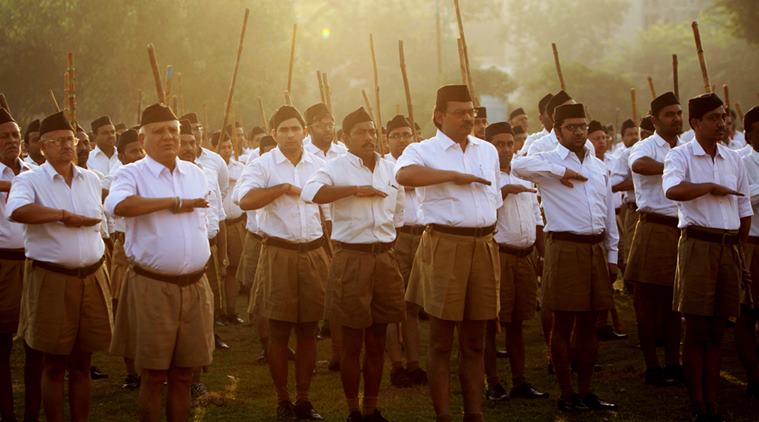 Express Photo By Amit Mehra
Express Photo By Amit Mehra
RSS Sarkaryavah Suresh Bhayyaji Joshi’s recent condemnation of the “torture of Scheduled Caste brothers” was unusual — in the resolutions the Sangh’s two top bodies pass every year, references to SCs have not been common. And ‘Dalit’ has appeared only once: in 1988, in the context of a “Dalit-Muslim” alliance, which the Sangh rejects.
Joshi also urged state governments to take “action against those who spread violence in the name of Gau Raksha”. Again, while the RSS has passed several resolutions on cow protection earlier, not once has it condemned Gau Rakshaks.
The Akhil Bharatiya Pratinidhi Sabha and Karyakari Mandal of the RSS pass several resolutions on social-cultural and political issues every year. The break from the past on the Cow and Dalits closely followed and echoed Prime Minister Narendra Modi’s remarks, in which he assailed “shops” being run in the name of cow protection, and asked the vigilantes who had attacked Dalits to “shoot [him], not [his] Dalit brothers”.
By contrast, in 2000 and 2001, when Atal Bihari Vajpayee was Prime Minister, the Sangh had demanded a countrywide ban on the killing of cows, strongly criticised their “merciless slaughter” to “placate a handful of Muslim groups”, and declared cow protection to be “an article of faith”.
RSS on Dalits/SCs
1988: Sixty-three years after the formation of the RSS, a Sangh resolution first termed untouchability an “anti-religious practice”, and urged “Swayamsevaks to work with greater earnestness towards the eradication of this pernicious social evil”. In 1974, RSS chief Balasaheb Deoras had said, “If untouchability is not wrong, nothing is wrong in the world.”
However, in the same speech, Deoras emphasised on avoiding a hurried approach towards ending the caste system — in line with the Sangh’s preference for a gradual, harmonious shift towards equality rather than sudden, revolutionary change. The 1988 resolution blamed the British for carrying out “a propaganda of such divisive theories like the Arya and the Dravid, the caste Hindus and the outcastes”, and slammed the “planned efforts” to “cut off the Vanvasi brethern and the so-called untouchables from the Hindu society”. The attempts to “forge a united front of Dalit-Muslim and aboriginals and Christians” are “inspired with the same ulterior motive”, the 1988 resolution said.
1989: SCs were mentioned in reference to reservations for neo-Christians. The RSS noted that the “Constitution makers had clearly laid down the provision with respect of the Scheduled Castes”, and said that “these concessions, if extended to non-Hindus would considerably be eaten up by the Christian converts and the already backward Scheduled Castes would be reduced to further backwardness”. It urged the government to “see through the dangerous implications of the design of the foreign inspired church” and appealed to “Harijan brothers” to “put up a powerful protest to defeat this mischievous move by anti-national forces”.
1990: The resolution remembered Dr B R Ambedkar on his birth centenary, praising him for “rejecting outright all the temptations extended by the Muslims and Christians”. Ambedkar, the resolution said, “persuaded his followers to embrace Buddhism, so that they will continue to remain a part and parcel of the nation’s cultural heritage”.
1994: The Sangh noted that “caste-based divisive social structure and obnoxious outdated customs are totally repulsive to our Dharma and extremely harmful to our national life”.
2005: On its 80th anniversary, the RSS expressed “deep concern over the increasing incidents of caste rivalry in the Hindu Society”, and said that “untouchability and feeling of so called ‘high caste’ and ‘low caste’ are evils haunting our society”.
RSS on Cow
1952: In its second resolution after Independence, the Sangh expressed “its keen sense of disappointment at the muddled policy of the Central government vis-à-vis the issue of cow protection”, and stressed that “it is a point of cultural sanctity and a symbol of our national oneness”. The Sangh reminded “the rulers once again through an organised expression of nation-wide public protest, of their sacred duty to protect bovine species”.
1958: The Sangh demanded a constitutional amendment to make an “effective provision for the banning of the slaughter of the cow and its progeny in the entire country”.
1960: The resolution noted that “cow is a point of national honour and veneration for Bharatvarsha”, and lamented that “it is most unfortunate that our present Constitution does not uphold and give effect to this national tradition”. It noted that “unless a categorial reference to ban cow slaughter is made in the Constitution, protection of this sacred point of national honour is not possible”.
1966: The resolution praised a “countrywide agitation by the Sarvadaliya Goraksha Mahabhiyan Samiti for a total and unreserved ban on the slaughter of cow species”.
1995: It recorded “deep appreciation of various people’s agitations to close down slaughter houses at Akberpur, Kanpur, Alkabir abattoir in Andhra Pradesh, and the successful movement at Dera Bassi in Punjab, as well as the protest by Jain organisations against loan schemes of IDBI to such slaughter houses.” It was “gravely anguished” that “3.5 lakhs cattle including 50,000 cows are slaughtered every day”. It slammed the central government for “trying to run scores of slaughter houses for earning meagre foreign exchange and securing minority support”, and exhorted Swayamsevaks “to assist and strengthen all movements for protection and preservation of cow”.
2000: The “central government [must] initiate legislation banning slaughter of cow and her entire family throughout the country.” It argued that “the belief that the cows and bullocks on becoming old turn out to be economic liability has no foundation in facts”, and asked the government to “appoint a Rashtriya Go Sewa Ayog empowering it with financial and executive powers adequate enough to provide for the protection of cattle wealth”.
2001: The resolution expressed “deep anxiety over the increasing decimation of the cow and her progeny” and slammed the “merciless slaughter of cattle wealth just to placate a handful of Muslim groups and to earn a little foreign exchange… In a democratic set-up, popular sentiments cannot be flouted. Cow protection is an article of faith,” it said, and urged “the central government to immediately put a stop to meat export and stop subsidies to slaughter houses and meat export enterprises”.
2010: The resolution talked about the Vishwa Mangal Gou-gram Yatra, “a meaningful initiative for the protection of cow”, during which “4.11 lakh villages” were covered and meetings were “attended by 1.5 crore people”.





- 01
- 02
- 03
- 04
- 05


